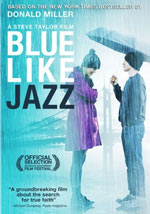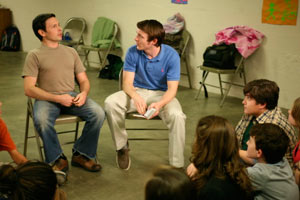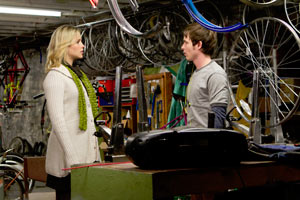

 - for mature thematic material, sexuality, drug and alcohol content, and some language.
- for mature thematic material, sexuality, drug and alcohol content, and some language.Don, a nineteen-year-old sophomore at a Texas junior college, tries to escape his Bible Belt upbringing for life in the Pacific Northwest at the most godless campus in America. (from IMDB.com)
By now, it's easy to have pre-conceived notions as to the kind of film you're going to get when walking into one that's dubbed a "Christian film." By association, Steve Taylor's adaptation of the book Blue Like Jazz fits the bill, but by the quality and content you can expect from a "Christian film," Blue Like Jazz is in a league of its own. [Warning: Some minor plot spoilers ahead, but I'll try to be as vague as possible]

I'll begin by saying I have not read Donald Miller's book Blue Like Jazz. The film is my first introduction to Miller and the world he's created with the story. The story serves as one that is influenced by Miller's own life experiences, as the movie's main character is actually named Don Miller. However, only some of the film's story elements are true, but the point and message of the film is as true and heartfelt as Miller can present it. With the help of budding indie film director Steve Taylor (who is known in the Christian community mostly for his solo music in the 80s and 90s and his stellar production work with artists like Newsboys and Sixpence None The Richer), Miller's ambitious and controversial story has been given wings, the end result of which is impactful... and has the potential to offend viewers almost as much as it does to inspire.
Most Christian-made films have a stigma for being poorly written, poorly directed, and especially poorly acted, and Blue Like Jazz avoids all of these well. While the heart and intentions are often in the right place with Christian films, there's a sanitized approach that is admirable for its reasoning, but often times is done in a hamfisted, unrealistic way, coupled with a spiritual conversion element that seldom, if ever, feels genuine. Still, a film like Fireproof, which does suffer from many of these problems, still managed to stir emotions and inspire. The truth is, we don't always need to see the real ugliness of life portrayed in its most realistic form to have a point conveyed effectively. However, Blue Like Jazz is a story that pretty much needs to be told in the way that it is. And that particular way isn't one you'll find stamped with a "Dove Approved" seal or recommended purchasing on Christian bookstore end caps anytime soon. As Steve Taylor puts it on BlueLikeJazzMovie.com, "I made it clear to all our potential investors and/or heads of media companies, the vast majority of whom were fellow Christians, that this was not going to be a family movie. The reason was simple: How do you tell the story of a college kid who flees his Southern Baptist upbringing in suburban Houston to attend the 'most godless campus in America' without showing what that environment is like? And how can that environment be portrayed realistically in the context of a 'family' movie? Doesn't have to be rated R, but it's probably going to be PG-13, right?"

Blue Like Jazz follows the life of a young man named Don Miller who is raised Southern Baptist by his mom in a small town in Texas. His dad is a pothead, which had lead to his parents getting divorced, and in the midst of getting ready to go off to college, he finds out that his dad has enrolled him at Reed College in Portland, Oregon. He turns down his dad's offer with plans to go to a local Christian college, but a disenchanting realization about some infidelity among a leader at his church pushes him to spontaneously hop in his car and drive to Portland to move into the dorms at Reed. He immediately is greeted by a rude awakening; many of the students are flamboyant and outrageous characters who are confident of who they are, but Don himself has begun to question everything he believes, sparked by the hypocrisy he saw in the church. He soon falls in with the wrong crowd, turning to drinking and partying and doing things he previously had never dreamed of doing. He basically comes to the point where he has renounced his faith when he discovers that the girl he'd begun pursuing is a self-proclaimed believer in Jesus. When he learns that she not only wasn't raised a believer, but accepted Jesus only a year or so before their meeting because she truly loves Him, this really challenges his thinking.
While at Reed, Don meets people of all kinds of backgrounds - gay, straight, bi, agnostic, drug-addicts, abused: real people with real issues and beliefs from all different kinds of backgrounds. It's enlightening to him, but he allows his confusion and disillusionment about what he believes to lead him to make some pretty terrible choices. In the midst of all of this, we see that God still has His hand on Don and his life. Everything that transpires during Don's story leads up to a scene where the true heart of Blue Like Jazz is revealed. And it proves to be, arguably, one of the most powerful scenes to appear in a "Christian film" to date. Don ultimately discovers what it really means to believe in and follow Jesus, making an epiphany that every believer can take to heart, and maybe even learn from.

To paint the picture of Don's prodigal son story as accurately as possible without presenting it in its probably more realistically rated-R fashion, Taylor and Miller opt for a solid PG-13 packaging, which includes some profanity, frequent sexually-related remarks and content and lots of drinking (and some drugs). There's a handful of uses of the "S" and "a" words, as well as one sort of incomplete use of the "F" word from Don (the audio wasn't the clearest at our screening, but it was pretty unmistakable). The movie handles things like sexuality and homosexuality in a pretty frank manner, while one scene shows a large blow-up condom balloon (that was used as part of a table display at a fair on campus) draped over a church steeple as part of a prank that's pulled on the church. There's a sense of irreverence that is portrayed -- not by Miller and Taylor, but by the characters who fight the belief in the existence of God, which leads them to do such things. Another scene involves a character telling Don about a story he'd heard about a young man who had been molested by a Catholic priest as a child. In addition to that, there's a character on campus who dresses as a pope and claims to speak for God, although he does it in a deliberately offensive way. While the character is based on a real-life character Miller encountered at Reed, these aspects are likely to offend Catholics, although they aren't presented in Blue Like Jazz for any other reason than to tell Miller's story (One Catholic at the screening I attended was deeply offended, while another insisted that they were not offended by it). Taylor and Miller set out to address real issues, real pain and real hurt in this film, and because these things are "real life" for these people, they are represented in this film. The only thing, aside from some of the sexual comments seeming a little unnecessary to include, was that I did feel like some of the profanity was a little much. While it's about on par with most PG-13 films, and is included with the intentions of grounding the film in more of a sense of reality, it still felt like a bit much for the film's core audience and demographic. Perhaps it's the fact that we know as we're watching it that this is a "Christian film" of sorts and this kind of content is usually avoided to make the films more acceptable and honoring of God, I don't know, but at the same time, I do fully understand why Taylor and Miller decided to tell this story in this way. It's not a movie with the sole purpose to entertain; it's a movie that hopes to serve as a reality check to believers trying to ignore touchy subjects, while at the same time re-presenting the Gospel message in an honest and realistic way--at least from the perspective of this young man's coming-of-age spiritual experiences.
While Steve Taylor's last directorial outing, The Second Chance, suffered from some flawed acting, Miller and Taylor have assembled a pretty skilled team of players this time around. Young actor Marshall Allman, who has appeared in shows like True Blood and Prison Break is great as Don, delivering a well-rounded and emotional performance. Claire Holt (from TV series The Vampire Diaries) is charming as the object of Don's affection, Penny, while Justin Welborn also does an excellent job as "The Pope." While Blue Like Jazz definitely has an indie film feel to it from start to finish (which is only bolstered by some pretty terrible CG animation in a couple scenes, but it's forgivable given the film's low budget), Taylor does an excellent job giving it a quality feel regardless. The strong acting certainly helps, but a hip soundtrack (that isn't limited to a list of popular CCM artists associated with the film company's record label), featuring songs that actually gel with what we're watching on screen, does strengthen the end result.
In the end, Blue Like Jazz is a powerful film that is different than anything you've ever seen associated with Christian filmmaking. The content is pretty rough and the movie does earn its PG-13 rating very well, but I'm not sure this story could have been told as impactfully if handled much differently (and that is coming from a movie watcher who really believes that movies do not need vulgarity to be good or entertaining). If youth leaders are considering screening this for their kids, I highly recommending seeing it first before doing so to allow for time to appropriately prepare yourself to discuss topics addressed in the film. It's not a family film by any means, but there is a wealth of things to discuss in Blue Like Jazz, so a well prepared Bible study could spark some fantastic discussion. Christian filmmakers can also learn a lot from Taylor's handling of, not only the Blue Like Jazz material, but also the quality of its presentation. The message of a Christian film is extremely important, but the way its told is just as crucial. Blue Like Jazz raises the bar for Christian filmmaking, and I'm eager to see what project Taylor devotes his talents to next.
- John DiBiase (reviewed: 3/23/12)
For those waiting for Blue Like Jazz to become a feature film, your chance to own it on DVD and Blu-Ray is here! We only had the DVD available at review time to check out, but it's a decent DVD release for those who aren't particular about high-definition movie watching. In addition to the feature film are the following DVD extras:
Audio Commentary with Director Steve Taylor, Director of Cinematography Ben Pearson, and Book Author Don Miller (1:47:39) - Ben, Steve and Don chat about the film and its actors and how the scenes came together as you watch the feature film. It's interesting to hear their thoughts on things and the technical side of putting together a movie like this. If you like any of these guys and are a big fan of the story and film, you'll want to listen to this.
Making Blue Like Jazz (11:41) - Author of the book, Donald Miller, takes us around the film sets while some scenes are being filmed, and then the featurette shifts gears entirely to feature Miller talking to us the viewer about the question "Is this a Christian movie?" We then hear from director Steve Taylor talking to the cast and crew about the meaning behind the story before Miller addresses to the viewers the topic of profanity and crude content represented in the movie. After that, we briefly see the final shot of the movie being filmed (which isn't the final scene in the movie) and then some snippet footage from "premiere week" in Portland, Reed College and Nashville. It's a pretty good making-of featurette, although it doesn't go as in-depth as you might expect it to.
The Music (6:23) - This is a short featurette about the film's composer Danny who created the original music for the film. Danny takes us on a tour of his in-home desk and studio (complete with his little dog, Geddy Lee), in a dry, ambiguously sarcastic manner that keeps you wondering if he's completely joking around for his own amusement or he's really just that eccentric. It's a bizarre but amusing featurette.
Save Blue Like Jazz (2:47) is a video that was made to explain the success of the Kickstarter campaign that fans launched to save the film production of Blue Like Jazz. In the end, $345,992 (more than twice its goal) was raised from 4,495 people to make sure the movie happened. Blue Like Jazz is currently the largest fan-funded movie in American history!
The Cast (4:18) is a brief rundown of the main cast in Blue Like Jazz and it features some great behind-the-scenes footage in addition to the cast talking about their respective characters. It's great, but I wish it could have been a little longer.
The Animator (1:18) - A kid announces this short video with "Five things to know about Jonathan Richter (By Steve Taylor)". It's a short series of random facts - most are silly - about Richter. The most intriguing fact, however, is that Jonathan had animated the famous "Cash Cow" music video by Steve Taylor years ago while still in art school.
This Is My Story (3:14) - This is a promo video made for the movie with personal testimonies from fans of the book and people close to Steve reflecting on Miller's story and how Blue Like Jazz is their story as well.
Deleted Shots (1:56) are short pieces of film that were omitted with the addition of "Reason for Deletion" captions on each one. For example, Don pouring Kool Aid is "Boring," the shot of a clock is "Cliche," a pan of a bathroom cabinet has "Too Many Pastels," a shot of bacon frying was cut due to "Vegan Protests," a table spread of food scraps is "Disgusting," some b-roll footage was cut due to "Forgot To Get Signed Waiver," a religious painting has "Symbolism Too Obvious," a close-up of a communion cup landing on a table because "Fireball Explosion Failed," kids playing at a youth group lock-in is "Too Gritty, Too Raw," Don walking up stairs into the light caused 'Test Audience Confusion," and finally: a close-up of a urinal cake and green water as it flushes was "Too Subtle, Too Classy." It's all meant to be funny and it's a pretty clever addition here.
Master Class: Directing Actors On Set (3:45) - Arguably the best extra, however, is right here in classic Steve Taylor humor fashion. For "Master Class," Steve takes b-roll shots of himself and others on set and overdubs it with ridiculous directions and tangents from himself as director. Highlights include running jokes about LOST and The Hunger Games and Steve trying instruct a bridge how to channel its emotions. Priceless.
Photo Gallery - There are about 68 photos from scenes in the movie and during production of Blue Like Jazz, viewable by clicking the arrows on your DVD player remote.
A trailer for the movie rounds out the special features. There aren't a ton of extras, but there are quite a few highlights here, so fans of the book and film should appreciate what the creative team assembled here.
- John DiBiase, (reviewed: 8/12/12)
Disclaimer: All reviews are based solely on the opinions of the reviewer. Most reviews are rated on how the reviewer enjoyed the film overall, not exclusively on content. However, if the content really affects the reviewer's opinion and experience of the film, it will definitely affect the reviewer's overall rating.
 Journey Member Jonathan Cain Releases "Only A Prayer Away" EP Journey Member Jonathan Cain Releases "Only A Prayer Away" EPFri, 27 Feb 2026 23:50:00 EST |
 Tommee Profitt x Jon Reddick Release New Song From Upcoming Project Tommee Profitt x Jon Reddick Release New Song From Upcoming ProjectFri, 27 Feb 2026 18:20:00 EST |
 AOH Music Invites Listeners to Listen to "BEHOLD (Acoustic Live), Vol. 2" AOH Music Invites Listeners to Listen to "BEHOLD (Acoustic Live), Vol. 2"Fri, 27 Feb 2026 18:19:00 EST |
 Micah Tyler Announces Release of New Song, "Perfectly" Micah Tyler Announces Release of New Song, "Perfectly"Fri, 27 Feb 2026 18:10:00 EST |
 CeCe Winans Announces Her Biggest Tour Yet with COME WORSHIP! Tour CeCe Winans Announces Her Biggest Tour Yet with COME WORSHIP! TourFri, 27 Feb 2026 18:00:00 EST |
 250 Artists Gather Together with Bill Gaither Ahead of His 90th Birthday, Out March 27 250 Artists Gather Together with Bill Gaither Ahead of His 90th Birthday, Out March 27Fri, 27 Feb 2026 17:55:00 EST |
 11th Hour's "Jesus In A Jail Cell" Serves Us a Universal Message 11th Hour's "Jesus In A Jail Cell" Serves Us a Universal MessageFri, 27 Feb 2026 17:47:00 EST |
 Click here All News Headlines |
Click here All News Headlines |